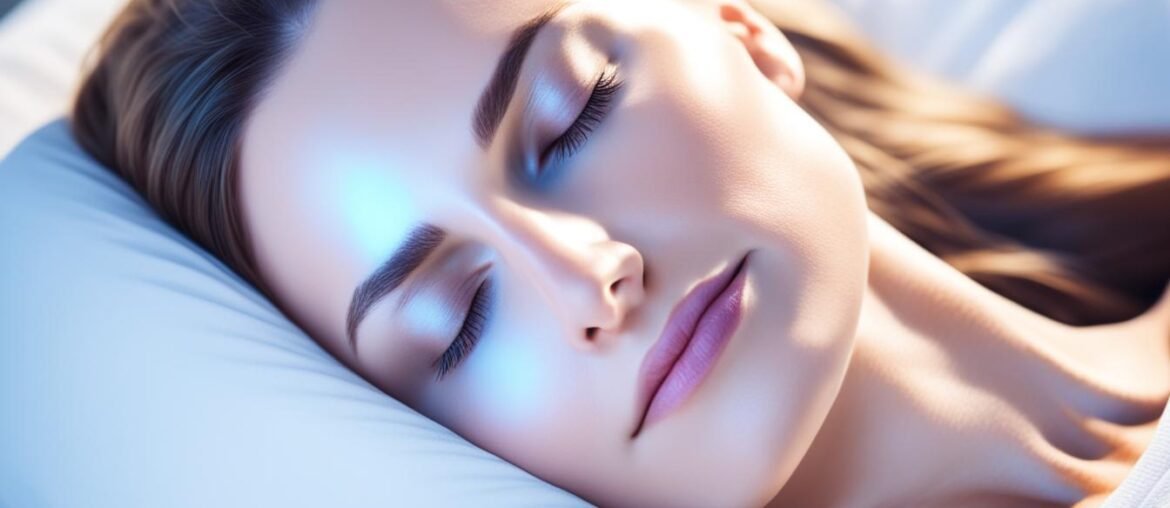Did you know that sleep plays a crucial role in the health and appearance of your skin? It’s not just about following a skincare routine or using the right products – getting enough quality sleep is essential for achieving and maintaining radiant skin.
Research has shown that lack of sleep can lead to various skin issues such as wrinkles, dark circles, and a dull complexion. When you don’t get sufficient sleep, your skin’s ability to repair and restore itself is compromised. This can result in a loss of collagen, impaired blood flow, and increased inflammation, all of which contribute to premature aging and skin damage.
So, how exactly does sleep affect your skin? Let’s explore the connection between sleep and skin rejuvenation in more detail.
- Sleep plays a crucial role in the repair and rejuvenation of your skin.
- Poor sleep can lead to wrinkles, dark circles, and a dull complexion.
- During sleep, your skin’s blood flow increases, collagen production is boosted, and UV damage is repaired.
- Establishing a regular sleep schedule and practicing good sleep hygiene can optimize the benefits of sleep for your skin.
- A bedtime skincare routine and using the right products before sleep can enhance skin rejuvenation.
How Sleep Affects Your Skin
Sleep plays a significant role in the health and appearance of your skin. Research has shown that poor sleep can have detrimental effects on your skin’s condition, leading to various issues such as hanging eyelids, swollen eyes, darker undereye circles, paler skin, more wrinkles and fine lines, and droopy corners of the mouth. Lack of quality sleep can not only affect your physical appearance but also impact how others perceive you in terms of attractiveness, health, sleepiness, and trustworthiness.
During sleep, essential processes take place within your skin to promote a youthful and glowing complexion. Your skin’s blood flow increases, allowing for better delivery of oxygen and nutrients to the skin cells. This increased blood flow also contributes to the removal of toxins and waste products, supporting skin rejuvenation. Collagen production, which is crucial for maintaining skin elasticity and preventing wrinkles, is boosted during sleep. Additionally, sleep is the time when your skin repairs the damage caused by UV exposure, helping to minimize the formation of age spots and wrinkles.
Considering the impact of sleep on your skin, it is essential to prioritize quality sleep as part of your skincare routine. By ensuring you get enough restful sleep each night, you can support your skin’s natural rejuvenation processes and wake up to a healthier, glowing complexion.
Importance of Quality Sleep for Skin
Quality sleep is essential for maintaining the health and vitality of your skin. When you sleep, your body goes into repair mode, focusing on replenishing and rejuvenating various organs, including your skin. During this period of rest, your skin undergoes essential processes that promote cell turnover, collagen synthesis, and repair of environmental damage. Without enough quality sleep, these processes can be compromised, leading to a dull complexion, fine lines, wrinkles, and other signs of premature aging.
Furthermore, sleep deprivation can disrupt hormone balance, increasing the production of stress hormones like cortisol. Elevated cortisol levels can trigger inflammation, which can aggravate skin conditions such as acne, eczema, and psoriasis. Lack of sleep also affects the skin’s moisture barrier, leading to increased water loss and dryness.
By prioritizing quality sleep and ensuring you get the recommended seven to nine hours of sleep each night, you can enhance skin health and promote a youthful, radiant appearance.
The Role of Sleep in Skin Repair

Sleep plays a crucial role in the repair and rejuvenation of your skin. During sleep, your body goes through essential processes that promote skin health and healing. Let’s explore the significant ways in which sleep contributes to skin repair.
- Increased Blood Flow: When you sleep, your skin’s blood flow increases. This heightened circulation helps deliver vital nutrients and oxygen to the skin cells, supporting their repair and renewal.
- Collagen Production: One of the key factors in skin repair is collagen production. During sleep, collagen synthesis is at its peak, helping to maintain the skin’s elasticity and reduce the appearance of wrinkles and fine lines.
- Repairing UV Damage: Sleep is also crucial for the repair of UV damage caused by sun exposure. While you sleep, your skin undergoes a restorative process that helps reduce the formation of age spots and wrinkles resulting from UV radiation.
By prioritizing sufficient and quality sleep, you can optimize the natural repair mechanisms of your skin, allowing it to heal, regenerate, and maintain a youthful appearance.
The Importance of Sleep for Collagen Production
Collagen, the most abundant protein in your body, provides structural support to your skin, giving it strength and elasticity. During sleep, your body produces collagen at an accelerated rate, helping to repair and maintain the skin’s structure.
“Quality sleep is like a natural collagen booster, supporting the skin’s integrity and reducing the signs of aging.”
Adequate sleep ensures optimal collagen production, improving the skin’s texture, reducing wrinkles, and promoting a youthful complexion.
The Impact of Sleep on UV Damage Repair
Exposure to UV radiation from the sun can cause skin damage, leading to premature aging and an increased risk of skin cancer. Sleep plays a vital role in repairing this UV damage.
“While you sleep, your skin initiates its own defense and repair mechanisms to counteract the harmful effects of UV rays.”
Through sleep, your skin can recover from UV-induced damage, minimizing the risk of wrinkles, age spots, and other signs of sun damage.
Tips for Getting a Good Night’s Sleep
To optimize your sleep quality and reap the benefits for your skin, follow these tips:
- Get a full night of sleep: Aim for seven to nine hours of sleep per night to ensure your body and mind have enough time to recharge and recover.
- Establish a regular sleep schedule: Go to bed and wake up at the same time every day, even on weekends, to regulate your body’s internal clock and promote better sleep quality.
- Create a sleep-friendly environment: Keep your bedroom cool, dark, and quiet. Consider using earplugs, eye shades, or a white noise machine to minimize disturbances that can disrupt your sleep.
- Practice relaxation techniques: Engage in activities that help you unwind before bed, such as taking a warm bath, practicing deep breathing exercises, or listening to calming music. These techniques can prepare your mind and body for a restful sleep.
- Avoid electronic devices: Limit your exposure to electronic devices, such as smartphones, tablets, and televisions, before bed. The blue light emitted by these devices can interfere with your natural sleep-wake cycle, making it harder to fall asleep.
- Use comfortable bedding: Invest in a supportive mattress, pillows, and bedding that promote good sleep posture and provide optimal comfort throughout the night.
- Avoid caffeine and heavy meals: Avoid consuming caffeine and heavy meals close to bedtime, as they can stimulate your body and make it harder to fall asleep. Opt for herbal tea or a light snack if needed.
- Limit alcohol consumption: While alcohol may make you feel drowsy initially, it can disrupt the quality of your sleep and lead to more fragmented sleep patterns. Limit your alcohol intake, especially close to bedtime.
By incorporating these healthy sleep habits into your routine, you can improve your sleep quality and promote the overall well-being of your skin.
Skincare Routine Before Bedtime
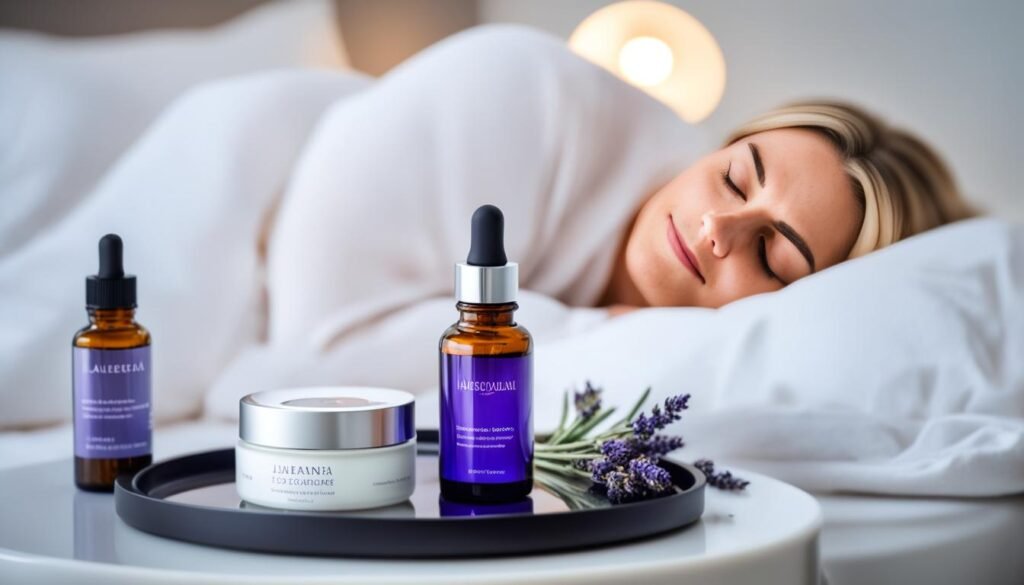
Establishing a nighttime skincare routine is crucial for maintaining healthy skin. Before bed, make sure to thoroughly cleanse your face to remove dirt, makeup, and excess oil that can clog pores. Use a gentle cleanser and avoid scrubbing too hard. After cleansing, apply an overnight moisturizer or a thicker cream to hydrate your skin while you sleep. You can also consider using an overnight sleeping mask for added hydration and nourishment. Taking care of your skin before bedtime helps to optimize the benefits of sleep for your skin rejuvenation and overall skin health.
The Benefits of a Bedtime Skincare Routine
A bedtime skincare routine is essential for maintaining healthy skin as it allows you to effectively remove impurities accumulated throughout the day. Thoroughly cleansing your face before bed helps prevent clogged pores, which can lead to breakouts and other skin issues. Additionally, overnight moisturization replenishes your skin’s moisture barrier, promoting hydration and reducing the appearance of dryness and fine lines. Incorporating a bedtime skincare routine ensures that your skin is properly nourished and prepared for the rejuvenating effects of sleep.
From cleansing to moisturizing, each step of your bedtime skincare routine plays a vital role in supporting the health and appearance of your skin:
| Step | Importance |
|---|---|
| Cleansing | Removes dirt, makeup, and excess oil |
| Toning | Restores skin’s pH balance |
| Treatment (Optional) | Targets specific skin concerns (e.g., acne, hyperpigmentation) |
| Moisturizing | Hydrates and nourishes the skin |
| Overnight Masks (Optional) | Provides intensive hydration and repair |
By incorporating a consistent bedtime skincare routine into your daily regimen, you can enhance the benefits of sleep and wake up to healthy, glowing skin.
The Importance of Sleep Position
Your sleep position can have a significant impact on the health and appearance of your skin. The way you position yourself during sleep can either promote or hinder skin health. When it comes to maintaining healthy and youthful-looking skin, sleeping on your back is considered the best position.
Sleeping on your back helps reduce the likelihood of wrinkles and creases caused by constant pressure on your face. When you sleep on your side or stomach, the friction and pressure on your skin can lead to sleep lines and wrinkles over time.
To further protect your skin while you sleep, consider using a satin or silk pillowcase. These materials minimize friction and reduce irritation on your skin, helping to keep it smooth and wrinkle-free.
The Benefits of Sleeping on Your Back
Sleeping on your back not only prevents wrinkles and creases but also has additional benefits for your skin. Here are some reasons why sleeping on your back is beneficial:
- Reduces the risk of acne breakouts: Sleeping on your back allows your skin to breathe, reducing the likelihood of clogged pores and acne breakouts.
- Prevents puffiness: Sleeping on your back helps prevent morning puffiness by allowing fluid to drain properly from your face and reducing the accumulation of fluid in the under-eye area.
- Supports lymphatic drainage: The lymphatic system plays a crucial role in removing toxins and waste from your body, including your skin. Sleeping on your back promotes optimal lymphatic drainage, allowing your skin to stay healthy and radiant.
By adopting the habit of sleeping on your back and using the right pillowcase, you can contribute to maintaining healthier and more youthful-looking skin over time.
| Sleep Position | Effects on Skin |
|---|---|
| Back | Reduces the likelihood of wrinkles and creases caused by pressure on the face. Promotes lymphatic drainage and prevents acne breakouts and puffiness. |
| Side or stomach | Increases the likelihood of sleep lines and wrinkles. Can lead to acne breakouts and puffiness due to pressure and friction on the skin. |
The Role of Hydration in Skin Health
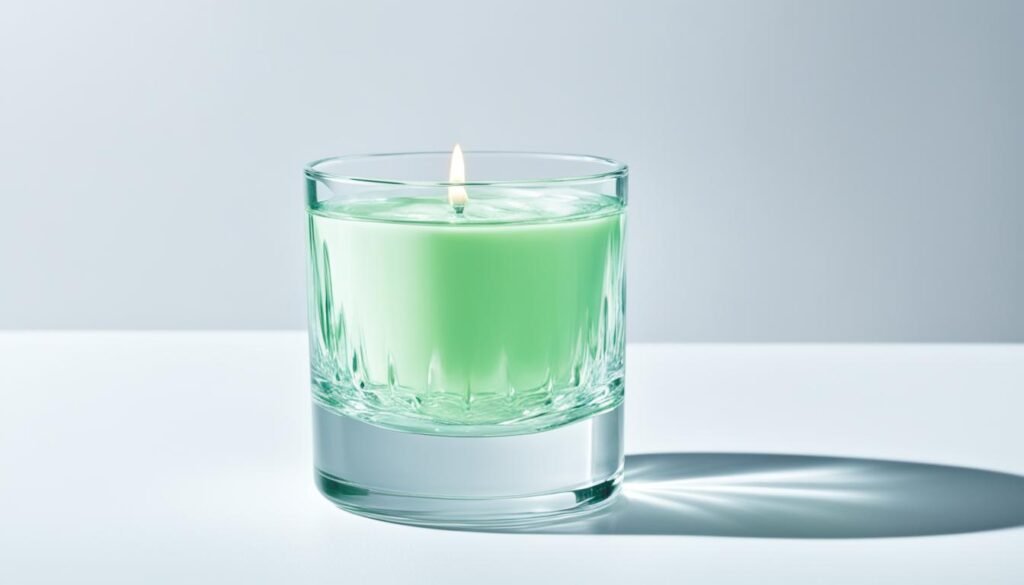
Hydration is essential for maintaining healthy skin. While drinking enough water is important, staying hydrated goes beyond just internal hydration. Lack of moisture in the air can dehydrate your skin, especially when you sleep in a low-humidity environment. Using a topical moisturizer before bed helps to lock in moisture and prevent overnight dehydration. Consider using a thicker cream or oil-based moisturizer that provides extra hydration during sleep. Keeping your skin well-hydrated promotes a healthy complexion and plumps up your skin, reducing the appearance of fine lines and wrinkles.
| Benefits of Hydration for Skin Health | How to Stay Hydrated |
|---|---|
| 1. Helps maintain skin elasticity | 1. Drink plenty of water throughout the day |
| 2. Reduces the appearance of fine lines and wrinkles | 2. Use a humidifier in low-humidity environments |
| 3. Promotes a healthy complexion | 3. Avoid prolonged exposure to dry and windy conditions |
| 4. Plumps up the skin | 4. Apply a hydrating moisturizer before bed |
Avoiding Sun Exposure During Sleep
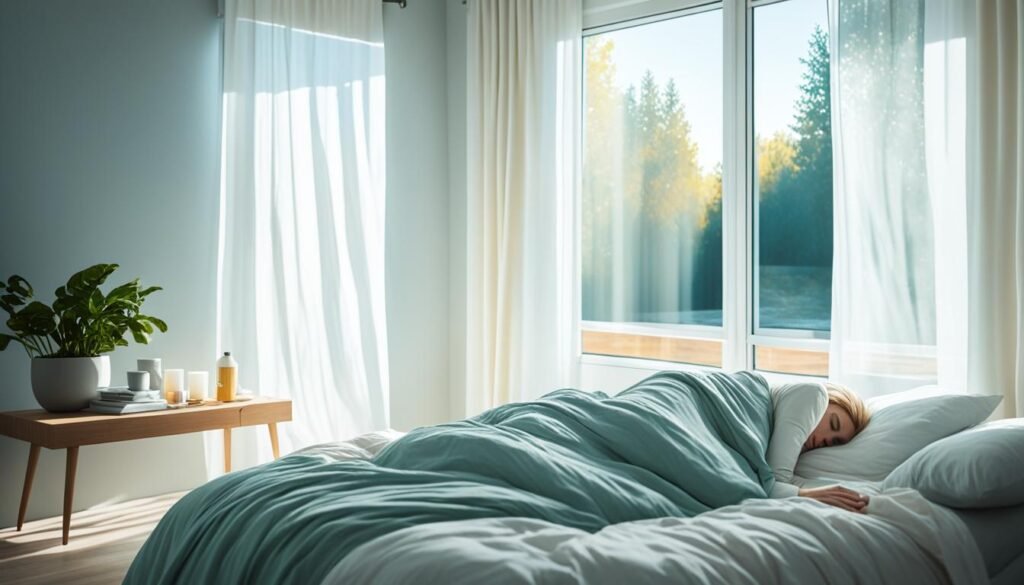
Exposure to sunlight while sleeping can have detrimental effects on your skin’s health and appearance. The sun’s harmful UV rays can penetrate through windows and cause damage to your skin, leading to premature aging, wrinkles, and sunspots.
To protect your skin during sleep, it is essential to take certain precautions:
- Ensure that your bedroom is dark and shielded from direct sunlight with blackout curtains or blinds. This will minimize the amount of sunlight entering the room and reduce the risk of sun damage to your skin.
- Consider using a broad-spectrum sunscreen during the day to further protect your skin from UV damage. Apply it generously to all exposed areas of your skin before going outside.
By minimizing sun exposure during sleep, you can maintain healthier and more radiant skin. It is important to prioritize protecting your skin from sunlight, even when you are not awake.
Comparison of Sun Exposure During Sleep
| With Sun Protection | Without Sun Protection | |
|---|---|---|
| Effects on skin health | Reduced risk of premature aging, wrinkles, and sunspots | Increased risk of premature aging, wrinkles, and sunspots |
| Recommended measures | Using blackout curtains or blinds, applying sunscreen during the day | No specific measures taken |
| Overall skin condition | Healthier and more radiant skin | Potentially damaged and aged skin |
Minimizing sun exposure during sleep is an important aspect of maintaining skin health. By taking the necessary precautions and protecting your skin from sunlight, you can ensure that your skin stays youthful and vibrant.
The Importance of Elevating Your Head

Elevating your head while sleeping can have significant benefits for both your sleep quality and skin health. By adopting this simple practice, you can alleviate common issues such as snoring, acid reflux, and nasal drip that can disrupt your sleep and affect the appearance of your skin.
One of the key advantages of elevating your head is improved blood flow. When you sleep with your head elevated, blood is less likely to pool under your eyes, reducing the appearance of bags and dark circles. This improved circulation also helps to deliver essential nutrients and oxygen to your skin cells, promoting healthier-looking skin.
There are several ways to elevate your head while sleeping:
- Add an extra pillow to raise the height of your head.
- Use a wedge pillow specifically designed to provide elevation and support.
- Prop up the head of your bed by placing blocks or risers under the legs.
By implementing one of these methods, you can effectively elevate your head and enjoy the benefits it brings to both your sleep and skin health.
Quote: “Elevating the head while sleeping not only improves sleep quality but also promotes better blood circulation, reducing the appearance of bags and dark circles under the eyes.” – Dr. Elizabeth Collins, Dermatologist
Benefits of Elevated Head for Skin Health
Elevating your head while sleeping can have a positive impact on your skin health in multiple ways:
| Benefit | Description |
|---|---|
| Improved blood circulation | Elevating your head enhances blood flow to your skin, delivering essential nutrients and oxygen for a healthier complexion. |
| Reduced under-eye bags and dark circles | Preventing blood from pooling under your eyes reduces puffiness and minimizes the appearance of bags and dark circles. |
| Alleviation of snoring | Elevating your head can help open up your airways, reducing the occurrence of snoring for a more restful night’s sleep. |
| Less acid reflux and nasal drip | By decreasing the effects of acid reflux and nasal drip, elevating your head promotes better sleep quality and prevents potential damage to the skin around the mouth and nose. |
With these benefits in mind, it’s clear that elevating your head while sleeping is a simple yet effective way to enhance your sleep and promote healthier, more radiant skin.
The Impact of Lifestyle Factors on Sleep and Skin
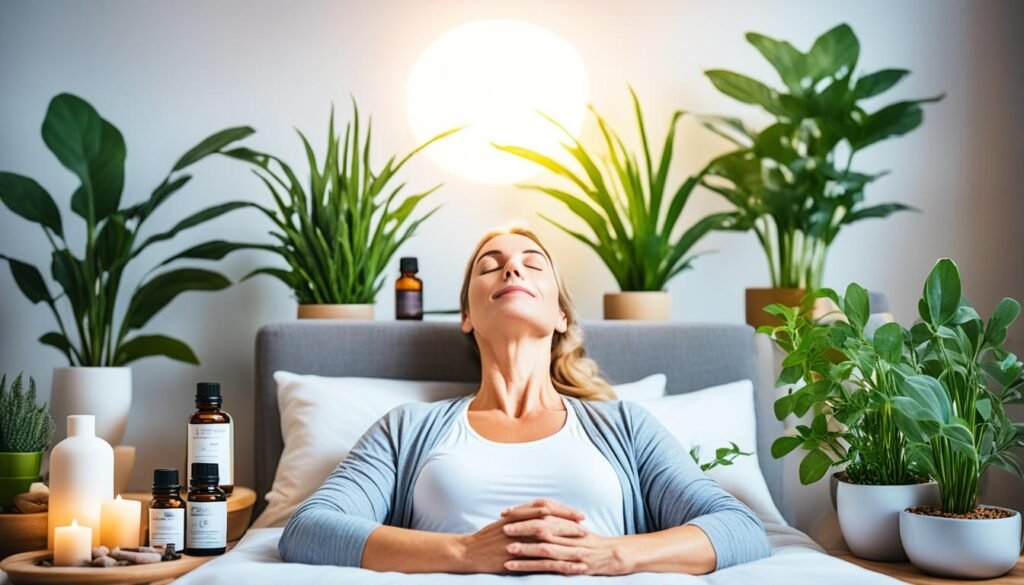
Your lifestyle choices have a significant impact on both the quality of your sleep and the health of your skin. It’s important to understand how certain factors such as diet and alcohol consumption can affect your sleep and skin rejuvenation.
The Role of Diet in Sleep Quality and Skin Health
Eating a balanced diet that is rich in vitamins, minerals, and antioxidants can promote better sleep and support skin health. Certain nutrients, such as magnesium, vitamin C, and omega-3 fatty acids, have been shown to improve sleep quality and regulate sleep patterns. Additionally, a healthy diet can provide the necessary nutrients for your skin to repair and regenerate during sleep, leading to a more youthful complexion.
Tip: Incorporate foods like leafy greens, fruits, fatty fish, and nuts into your diet to optimize your sleep and skin health.
The Negative Effects of Excessive Alcohol Consumption
While alcohol might make you feel drowsy initially, it can disrupt the quality of your sleep and have detrimental effects on your skin. Alcohol acts as a sedative, which can help you fall asleep faster, but it also leads to fragmented and less restorative sleep. This can result in poorer skin health, including dullness, dryness, and a higher likelihood of skin aging.
Tip: Limit your alcohol consumption, especially close to bedtime, to improve your sleep quality and maintain healthy skin.
The Connection Between Lifestyle and Skin Rejuvenation
By maintaining a healthy and balanced lifestyle, you can optimize your sleep and promote overall skin rejuvenation. A combination of adequate sleep, a nutritious diet, regular exercise, and stress management techniques can greatly contribute to your skin’s health and appearance.
“Adopting a healthy lifestyle not only improves your sleep and skin, but it also enhances your overall well-being and quality of life.” – Dr. Anna Johnson
Creating a balanced lifestyle that supports quality sleep and healthy skin involves making conscious choices in your daily routine. Prioritize self-care, maintain a nourishing diet, and avoid excessive alcohol consumption to maximize the benefits of sleep and achieve radiant, rejuvenated skin.
The Connection Between Sleep and Mental Well-Being

Quality sleep is not only essential for the health of your skin but also plays a vital role in your mental well-being. The relationship between sleep and mental health is significant, with sleep having a profound impact on your emotional well-being. Lack of sleep can lead to increased stress levels, irritability, and difficulties in managing emotions.
On the other hand, getting enough restful sleep has been shown to improve mood, reduce stress, and enhance overall emotional well-being. When you prioritize sleep and take care of your sleep hygiene, you can experience a positive impact on both your skin and your overall quality of life.
“Sleep is that golden chain that ties health and our bodies together.” – Thomas Dekker
Importance of Sleep for Mental Health
Sleep plays a vital role in maintaining a healthy mental state. Here’s how sleep influences your mental well-being:
- Emotional regulation: Adequate sleep helps regulate emotions by improving emotional stability and resilience. It allows you to respond to daily stressors in a more controlled manner.
- Stress reduction: Quality sleep helps reduce the production of stress hormones, making you feel calmer and more capable of handling challenges.
- Improved cognitive function: Getting enough sleep enhances cognitive performance, including better memory, focus, and decision-making abilities.
- Enhanced mood: Sleep deprivation can lead to mood swings, irritability, and an increased risk of developing mood disorders such as depression and anxiety.
- Optimal mental functioning: Sleep allows the brain to rest and recharge, improving overall mental clarity, creativity, and problem-solving abilities.
The Sleep-Emotion Connection
During sleep, the brain goes through various stages, including rapid eye movement (REM) sleep and deep sleep. These stages are crucial for emotional processing and regulation:
- REM sleep: This stage is associated with emotional memory consolidation, helping to process and integrate emotions from the day.
- Deep sleep: Deep sleep plays a vital role in restoring the body and mind, promoting emotional resilience and stability.
When you don’t get enough sleep, these essential stages are disrupted, leading to difficulties in managing emotions, increased sensitivity to negative stimuli, and reduced emotional resilience.
| Sleep Quality | Emotional Well-Being |
|---|---|
| Good quality sleep | Enhanced mood, reduced stress levels, improved emotional regulation |
| Poor quality sleep | Increased stress levels, mood swings, irritability, decreased emotional control |
Improving Sleep for Better Mental Health
To optimize your sleep for improved mental well-being, it’s important to establish healthy sleep habits:
- Stick to a consistent sleep schedule, going to bed and waking up at the same time every day.
- Create a calm and comfortable sleep environment by keeping your bedroom dark, cool, and quiet.
- Avoid stimulating activities and electronic devices before bedtime.
- Engage in relaxation techniques like deep breathing exercises or meditation to signal your body and mind that it’s time to sleep.
- Exercise regularly, but avoid vigorous activity close to bedtime.
- Avoid consuming caffeine or heavy meals close to bedtime.
By prioritizing sleep and implementing these habits, you can improve your sleep quality, support your mental well-being, and experience the positive impact it has on your overall skin health.
Conclusion
Sleep is an essential component of a successful skincare routine. It is during sleep that your body undergoes crucial repair and rejuvenation processes, including the restoration of your skin. By prioritizing quality sleep and adopting effective sleep hygiene practices, you can unlock the powerful benefits of sleep for your skin rejuvenation journey.
Getting sufficient sleep allows your skin to repair itself, promoting a youthful and radiant complexion. It enhances blood flow, stimulates collagen production, and aids in the repair of UV damage, reducing the appearance of wrinkles, fine lines, and age spots. Additionally, quality sleep contributes to improved overall skin health, preventing issues such as dull complexion, dark circles, and sagging skin.
To optimize your sleep for skin rejuvenation, establish a consistent sleep schedule, create a sleep-friendly environment, and practice relaxation techniques before bed. Follow a bedtime skincare routine that includes thorough cleansing, overnight moisturization, and protection from sun exposure. Consider the impact of sleep position, hydration, and lifestyle factors on your skin health. By incorporating these practices, you can harness the power of sleep to achieve and maintain healthy, youthful skin.
FAQ
What is the importance of sleep for skin rejuvenation?
Sleep plays a crucial role in skin rejuvenation by allowing the body to repair and restore itself, including the skin. Lack of sleep can lead to various skin issues such as wrinkles, dark circles, and a dull complexion. Prioritizing sleep as part of your skincare routine is essential for achieving radiant and youthful-looking skin.
How does sleep affect your skin?
Lack of sleep can result in hanging eyelids, swollen eyes, darker undereye circles, paler skin, more wrinkles and fine lines, and droopy corners of the mouth. On the other hand, during sleep, your skin’s blood flow increases, collagen production is boosted, and UV damage is repaired. It is during sleep that your skin undergoes essential recovery processes for a youthful and glowing complexion.
What is the role of sleep in skin repair?
Sleep is crucial for skin repair and rejuvenation. During sleep, your skin’s blood flow increases, providing essential nutrients and oxygen to the skin cells. It is also during this time that collagen production is at its peak, helping to maintain skin elasticity and reduce the appearance of wrinkles. Additionally, sleep allows for the repair of UV damage, reducing the formation of age spots and wrinkles caused by sun exposure.
What are some tips for getting a good night’s sleep?
To optimize your sleep quality, consider the following tips:
– Aim for seven to nine hours of sleep per night.
– Establish a regular sleep schedule.
– Create a sleep-friendly environment.
– Practice relaxation techniques before bed.
– Avoid electronic devices and stimulating activities before bedtime.
– Use comfortable bedding and pillows.
– Avoid caffeine and heavy meals close to bedtime.
– Limit alcohol consumption.
What should be included in a skincare routine before bedtime?
Before bed, make sure to thoroughly cleanse your face to remove dirt, makeup, and excess oil that can clog pores. Use a gentle cleanser and avoid scrubbing too hard. After cleansing, apply an overnight moisturizer or a thicker cream to hydrate your skin while you sleep. Consider using an overnight sleeping mask for added hydration and nourishment.
What is the importance of sleep position for skin health?
Sleeping on your back is considered the best position for your skin as it reduces the likelihood of wrinkles and creases caused by constant pressure on your face. Sleeping on your side or stomach can lead to sleep lines and wrinkles over time. Using a satin or silk pillowcase can also minimize friction and reduce irritation on your skin.
How does hydration impact skin health?
Hydration is essential for maintaining healthy skin. Using a topical moisturizer before bed helps to lock in moisture and prevent overnight dehydration. Consider using a thicker cream or oil-based moisturizer for extra hydration during sleep. Keeping your skin well-hydrated promotes a healthy complexion and reduces the appearance of fine lines and wrinkles.
How can I avoid sun exposure during sleep?
Sun exposure while sleeping can lead to premature aging, wrinkles, and sunspots. Ensure that your bedroom is dark and shielded from direct sunlight with blackout curtains or blinds. Consider using a broad-spectrum sunscreen during the day to further protect your skin from UV damage.
What is the importance of elevating your head while sleeping?
Elevating your head can help alleviate snoring, acid reflux, and nasal drip, which can disrupt your sleep and impact your skin’s appearance. By improving blood flow, elevating your head prevents blood from pooling under your eyes, reducing the appearance of bags and dark circles. You can achieve this by adding an extra pillow, using a wedge pillow, or propping up the head of your bed.
How do lifestyle factors affect sleep and skin?
Your lifestyle choices significantly affect both the quality of your sleep and the health of your skin. A balanced diet rich in vitamins, minerals, and antioxidants promotes better sleep and supports skin health. Excessive alcohol consumption disrupts sleep quality and leads to dehydration, negatively impacting your skin. It is important to maintain a healthy and balanced lifestyle to optimize sleep and promote overall skin rejuvenation.
What is the connection between sleep and mental well-being?
Quality sleep not only benefits your skin but also plays a crucial role in your mental well-being. Lack of sleep can lead to increased stress, irritability, and difficulty managing emotions. On the other hand, getting enough restful sleep improves mood, reduces stress levels, and enhances overall emotional well-being. Prioritizing sleep can positively impact your skin and overall quality of life.

